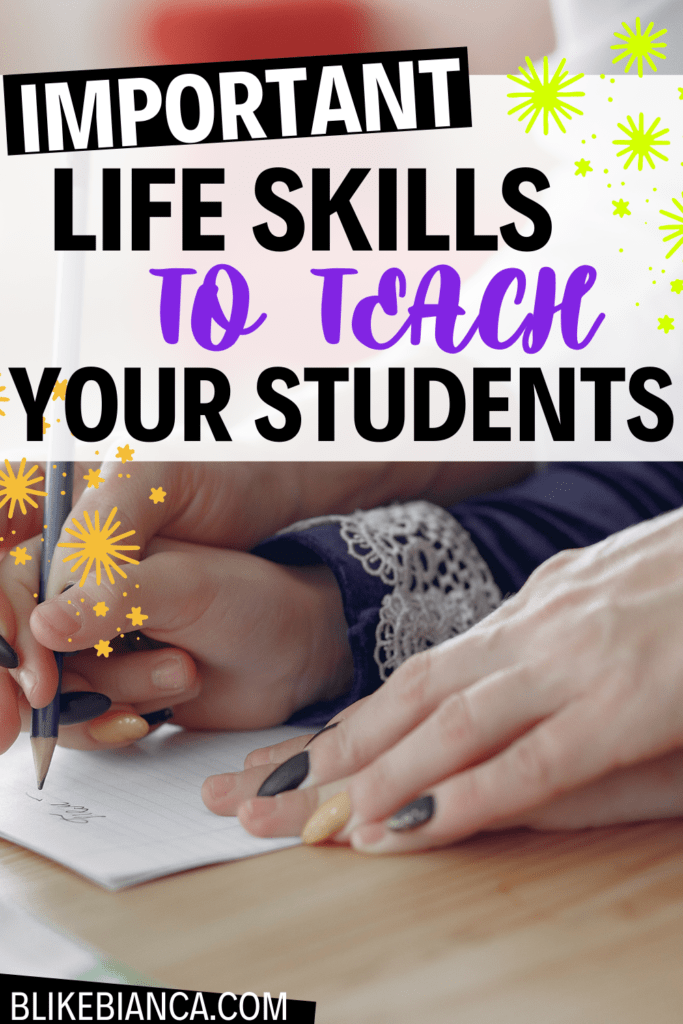Although your students mostly focus on academics in the classroom there are many beneficial life skills that you can weave into lesson plans and in your classroom. These are skills that all students should have that will help them well into adulthood.
These important life skills are also great when thinking about adding rigor to your lessons while also great during professional observations. You’ll earn those “distinguish points” with your administrators even if it is your first year of teaching!
7 Important Life Skills to Teach Your Students

1. Asking Questions.
You might think this is level 1 type of knowledge but asking questions, leads to greater thinking. Asking questions to you, their peers, staff in the building, their family…getting students to talk makes a big difference in their lives. This is especially true in the world of social media and the digital age. Student can learn to explore by asking questions, most importantly on their own without prompting.
2. The Ability to Solve Problems.
Life is full of challenges. Having students figure out how to be success in school, making a team, running for class office, these are common challenges students face. When they become an adult, figuring out how to be successful navigating through a new job or a new lifestyle change becomes easier once they have the ability to strive to figure out solutions on their own. Life will be less intimidating for them when they learn the processes that will help them conquer challenges, whatever that may be.
3. Finding a Passion.
Start getting students to find their passion early on. Using differentiation can help a student love science who never in a million years thought they would like it. As teachers we want to focus on training students to go out and find the things that excite them and motivate them. Their future may not be a traditional route of going to college and getting a job. Every student should have something they are passionate about and focus on the independent to attach to it early on.
4. Independence.
Giving a student more independence in the classroom might be a challenge for us teachers. We want to have our systems and routines and we need to make sure they are in place without chaos. However, students need to be nurtured to become more and more independent as they grow up. When you are working on your next lesson, strive to increase your student’s independence a little bit at a time, where they are focused on knowing what works well for their success in terms on assignment completion and even assessment.
5. Being content when alone.
Some students, especially depending on age, are incapable of spending even 15 minutes without the attention of others. As they progress, they learn to attach to other things to find contentment. For the most part that is their electronics, the use of the internet, playing video games and more, they all become addictions in their own way but it’s also a way of avoiding being alone. Finding the ability for students to deep think by helping focus on just being alone with their thoughts is powerful. It will help students make their life easier with fewer destructive temptations, and important skill to have.
6. Compassion.
The ability to work well with others and control our own anger is directly tied to our ability to be compassionate toward others. Continued practice for students to strive to be more compassionate in their everyday lives begins with modeling. Focusing on teaching students to be be compassionate is one of the greatest gifts they can learn at an early age and will be the norm over time.
7. Dealing with change.
Change is one of the few constants in life. Those who can be flexible and deal with change effectively are much more successful and happier than those who can’t. Helping your students learn to deal with this life skill takes practice because when the unexpected change happens it will bring your classroom together.
While these 7 important life skills teach some of things are not required, they are necessary. They can be even more valuable than the content area curriculum that for some us, are forced to teach. Check your students for the presence of these skills, your future and their future will be much better for it.
For further reading check out:
How to Create a Social/Emotional Learning Classroom
